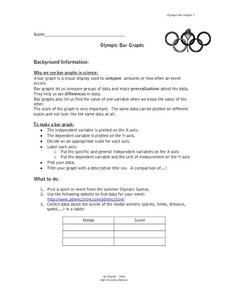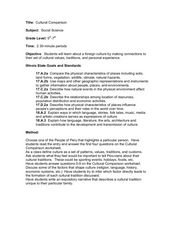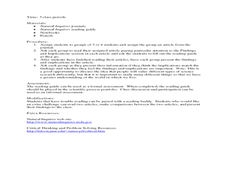Curated OER
Olympic Bar Graphs
For this Olympic bar graph worksheet, students pick a sport from the 2004 Olympic games and find data from the Olympic web page. They graph the scores (times, distance, or speed) and the medals. They answer questions about the variables...
Curated OER
Germs and Preventing Illness: An Inner and Outer
First graders looks at germs through a microscope and identify two that can make us sick. They compare their mouth before and after they brush their teeth and practice proper hand washing techniques. They study the impact of Edward...
Curated OER
Dressing in Early American Times
Fifth graders, by doing research and seeing actual and simulated artifacts, gain knowledge of and make comparisons about clothing in the Colonial and early Republican eras with attire of present time.
Curated OER
The Status Of Private Schools In Utah
Students investigate the status of private schools in Utah. This done by looking at the public school system and make comparisons. The question of private schools being better is not clear and many factors need to be considered in...
Curated OER
Cultural Comparison
Young scholars choose from a group of entries about the culture of Peru. In this Peruvian culture lesson, students understand the definition of culture. Young scholars describe the culture of Peru researched in the entry and complete a...
Shodor Education Foundation
Spinner
Go round and round to compare theoretical and experimental probabilities. Learners set the number of sectors and the number of spins for a spinner. Then, a table displays the experimental and theoretical probabilities of the spinner for...
Curated OER
The Effect of Temperature on Cricket Chirping
High schoolers examine the effect of temperature on how often crickets chirp. In groups, they complete the experiment and answer lab discussion questions. They create a graph of temperatures and the amount of chirps and discuss the results.
Curated OER
Tree Identification - Up Close And Personal
Fourth graders go to an outdoor area and are assigned a specific native plant to observe. They read about and answer questions about their tree. They draw the tree. Finally, 4th graders teach the rest of the class about their tree.
Curated OER
Theobroma - Food of the Gods
Students discuss the history of cacao and its use in the production of chocolate. They analyze actual cacao pods and record their observations. Finally they create a five minute contour drawing of the cacao pod and seeds.
Curated OER
Crystal Growing
Students grow crystals and document their observations by recording timeing and growth. Additional characteristics of crystals are observed under a black light, by growing under different conditions and mineral content is determined.
Curated OER
Comparing Temperatures and Latitudes
Eighth graders collect weather data from a variety of cities at the same latitudes, but on different continents. They organize data using spreadsheet program, generate graphs, and incorporate into a word processing document. Students...
Curated OER
Panda-Monium!
Students compare and contrast two species' characteristics. They then complete a Venn Diagram and practice web browser navigation skills, including moving from one window to another.
Curated OER
Graphing the Facts
Students investigate the correlation between our planet's weather and solar activity. They analyze and discuss data regarding the solar activity cycle, graph annual precipitation and temperature averages over a period of 100 years, and...
Curated OER
Comparing Roots After Rotation of Ninety Degrees
Students conduct an experiment and use different measurements of a single root to illustrate the mechanism of plant movement.
Curated OER
Population Biology
Young scholars define the following terms: predation, competition, carrying capacity and population. They can explain the patterns of growth and the limitations of growth. Students explain the difference between density-dependent and...
Curated OER
Endangered Species
Ninth graders graph data in order to compare the number of extinct species and a rise in human population. They analyze the data collected. Students are encouraged to infer the relationship.
Curated OER
Mammals
Students gather information from an online database about mammals. Choosing one mammal, they compare its physical characteristics, food habits, behavior and location to the other mammals they were introduced to in this lesson. In groups,...
Curated OER
Hardware Sort
Students classify various hardware items using the attributes of the objects. In this classification lesson, students group objects based on their attributes and explain their classification key.
Curated OER
Discussing the Findings and Implications
Learners read a Natural Inquirer article and present the findings and implications to the class. They discuss if the findings match the implications and whether they think they are important.
Curated OER
How Many Drops of Water Can Fit on a Penny?
Using a simple method, learners explore gravity, cohesion, and adhesion. They perform an experiment in which they determine how many drops of water can fit on a penny. Afterwards, they discuss their results.
Green Learning
Build Your Own Biogas Generator
Where this is not exactly a lesson plan, it is a terrific outline of how to generate biogas from an animal manure sample. If you are up for the challenge, the generator can be built by your class as a concluding project at the end of an...
ReadWriteThink
Decoding the Dystopian Characteristics of Macintosh’s “1984” Commercial
Known as one of the most iconic advertisements of the 20th century, Macintosh's "1984" commercial has become more of a social statement. Present the ad to a new audience of viewers with a lesson focused on identifying dystopian...
Curated OER
Who Needs What?
Students identify the physical needs of animals and if plants need the same things as animals. They conduct an experiment to see if plants need light and water to grow. They compare the growth of the plants exposed to the different...
Curated OER
A Study in Paper Permanence
Twelfth graders compare the permanence of papers by testing pH, determining presence of alkaline reserve as well as fold endurance, and testing lignin content.
They indicate the strength by using a starch test as a comparison.

























